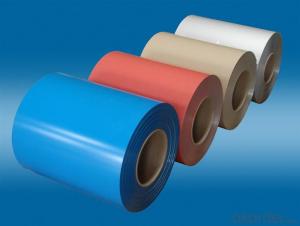Color Coated Aluminum Coils Manufacturer
- Loading Port:
- Shanghai
- Payment Terms:
- TT OR LC
- Min Order Qty:
- 5 m.t.
- Supply Capability:
- 5000 m.t./month
OKorder Service Pledge
OKorder Financial Service
You Might Also Like
l Product Introduction:
1 | Alloy: | A1100, A1050, A1060,A3003, A3004, A3005, A3105 , A5052, , A5754, A8011 etc. |
2 | Temper: | H14, H16, H18, H24 etc. |
3 | Thickness: | 0.2mm - 2.0mm |
4 | Width: | 15mm - 1600mm |
5 | Color: | chromic,white,metallic and so on(Customized, choose from RAL color chart or refer to customers' counter sample.) |
6 | Coating: | Polyester(mainly),Fluorocarbon(mainly), polyurethane and epoxy coating ect. |
7 | Coating thickness: | PVDF≥25 micron; PE≥18 micron. |
8 | Surface Quality: | be free from Oil Stain, Dent, Inclusion, Scratches, Stain, Oxide Dicoloration, Breaks, Corrosion, Roll Marks, Dirt Streaks and other defect which will interfere with use. |
9 | Mechanical Property: | Chemical Composite and Mechanical Property are meted with GB/T, ASTM, ENAW Standard. |
10 | Interior diameter: | 105mm or 405mm or 505mm |
11 | Coating hardness: | (pencil hardness) more than 2H |
12 | Impact resistance: | no cracking and peeling(≥50kg/cm) |
13 | Flexibility(T-bend) : | ≤ 2T |
14 | MEK resistance: | more than 100 |
18 | Application: | roofs, facade cladding, ceilings, aluminum curtains, composite panels, pipe wrap, advertisement plates, instrument panels, and other uses. |
l Packaging & Delivery
Packaging detail: Standard seaworthy exporting carton, Wooden
pallets, waterproof paper and plastic coverage or or
as customer's requirements
Delivery detail: about 25 days from received oiginal L/C or advance payment
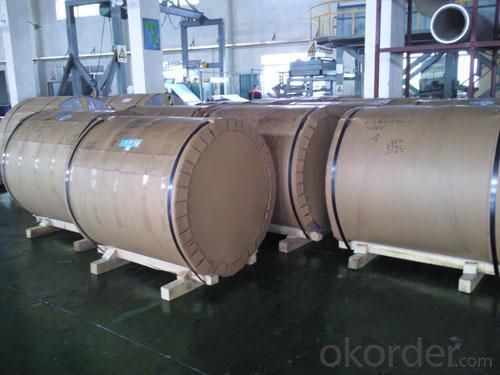
l Company Profile
CNBM International Corporation, China National Building Materials (Group) Corporation, is one of the largest companies in China building material & equipment industry, with 42,800 employees and sales in 2005 of US Dollar 4.395 billion. In 2006, China National Building Material Company Limited was listed on Hong Kong Stock Market with the stock code as 3323.
The business scope of CNBM covers from manufacturing and sales of a series of building materials to scientific research and design, import and export trade. In many of these fields, CNBM is playing the leading role.
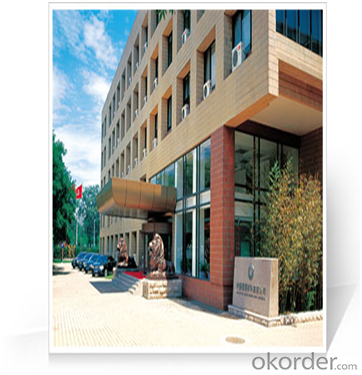
l Product Images
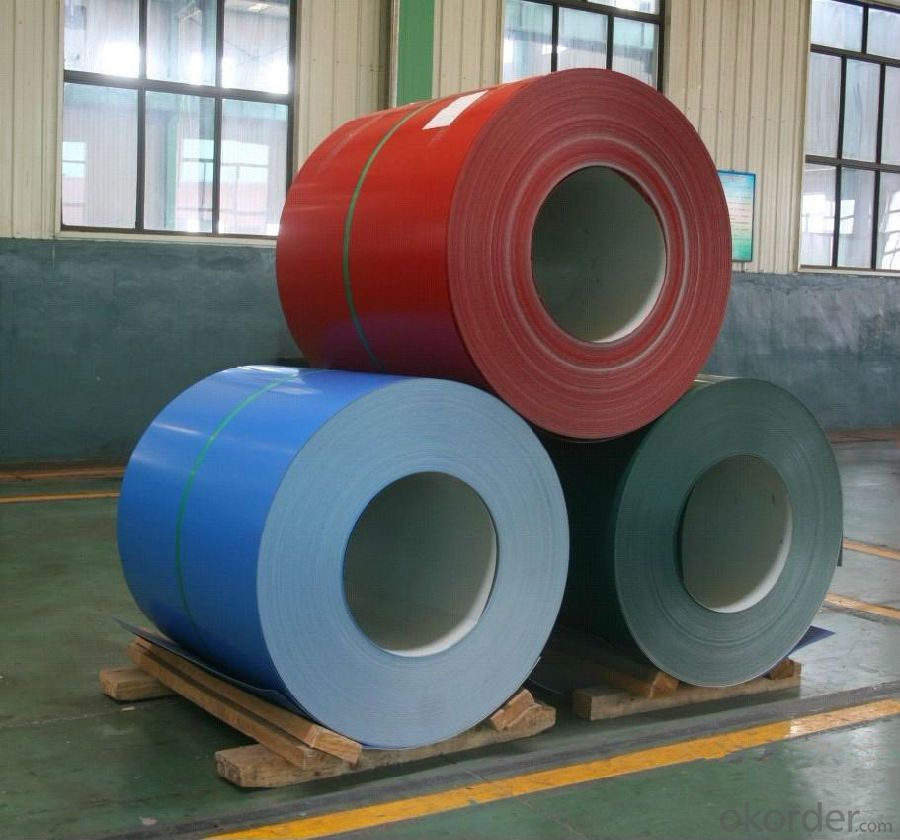
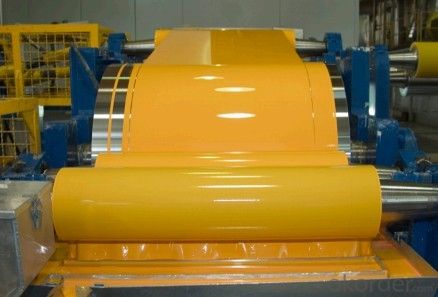
l FAQ
Q: Do you provide free samples?
A: Yes, free samples will be sent to you on freight at destination.
Q: Can I get your latest products catalogue?
A: Yes, it will be sent to you in no time.
Q: What is the MOQ?
A: 5 tons
Q: What are your payment terms?
A: We accept L/C, T/T.
l Contact Us
Email: service@okorder.com
- Q:Are aluminum coils fire-resistant?
- Yes, aluminum coils are fire-resistant. Aluminum has a high melting point of 660 degrees Celsius (1220 degrees Fahrenheit) and it does not burn, making it a non-combustible material. This property makes aluminum coils suitable for various applications where fire resistance is a critical factor, such as in building construction, electrical wiring, and HVAC systems. Additionally, aluminum's excellent heat conductivity helps dissipate heat quickly, reducing the risk of fire. However, it is important to note that while aluminum coils themselves are fire-resistant, they may be used in systems that include other components which may not have the same level of fire resistance. It is important to consider the entire system and follow proper fire safety regulations and guidelines to ensure overall fire safety.
- Q:Can aluminum coils be used in the production of aluminum curtain walls?
- Indeed, aluminum coils possess the capability to be utilized in the fabrication of aluminum curtain walls. In the manufacturing procedure of aluminum curtain walls, it is customary to employ aluminum coils as the primary material. These coils are subjected to various processes, such as rolling, cutting, and shaping, in order to fashion the desired components of the curtain wall system. Due to its lightweight nature and resistance to corrosion, aluminum proves to be an optimal substance for curtain walls, as it imparts both structural stability and durability to the building facade, along with an appealing aesthetic. In essence, aluminum coils assume a vital role in the creation of aluminum curtain walls, guaranteeing the excellence and functionality of the end product.
- Q:Are there any limitations on the bending or shaping of aluminum coils?
- Aluminum coils do have limitations when it comes to bending or shaping. Despite being a soft and malleable metal, there are factors that can affect its bendability. The thickness of the aluminum coil plays a role in its bendability. Thicker coils are generally more difficult to bend compared to thinner ones because they have increased resistance to deformation. The temper or hardness of the aluminum coil also affects its bendability. Different tempers, such as soft, half-hard, or hard, have varying degrees of malleability. Soft tempers are easier to bend, while harder ones require more force and may be prone to cracking or breaking during bending. The desired bend or shape's design and complexity can impose limitations as well. Sharp bends or intricate shapes may cause the aluminum coil to crack or deform, especially if it lacks proper support or if the bending radius is too small. Impurities, defects, or alloying elements present in the aluminum coil can also impact its bendability. These factors can lead to inconsistencies in the material's mechanical properties, making it more susceptible to cracking or breaking during bending or shaping. Therefore, it is crucial to consider the thickness, temper, design, and quality of the aluminum coil to ensure successful and safe bending and shaping.
- Q:What is the modulus of elasticity of aluminum coils?
- The modulus of elasticity of aluminum coils is typically around 70 GPa (Gigapascals).
- Q:How do aluminum coils contribute to sustainable packaging?
- Sustainable packaging practices are greatly influenced by aluminum coils. Firstly, aluminum possesses the unique quality of being infinitely recyclable, meaning it can undergo recycling processes repeatedly without compromising its properties or quality. This aspect significantly enhances the sustainability of packaging as it reduces the necessity of extracting and processing new materials, thereby conserving natural resources and minimizing the environmental impact associated with mining and production. Furthermore, aluminum coils boast exceptional barrier properties, effectively safeguarding packaged goods from external elements including moisture, light, and oxygen. This barrier function plays a crucial role in prolonging the shelf life of products, thereby reducing food waste and eliminating the need for additional packaging or preservatives. By maintaining the freshness of products for extended periods, aluminum coils contribute to sustainable packaging efforts by combating food loss and promoting resource efficiency. Moreover, aluminum's lightweight nature makes it an ideal material for packaging. Its low weight allows for reduced transportation costs and energy consumption during shipping, ultimately leading to a decrease in overall carbon emissions. Additionally, the lightweight characteristic of aluminum coils makes them convenient for end consumers, thereby minimizing the environmental impact associated with disposal and recycling. Additionally, aluminum demonstrates high durability and resistance to corrosion, ensuring the integrity of packaging throughout its lifecycle. This durability allows for the reuse or repurposing of aluminum coils, further reducing waste and extending the material's lifespan. In conclusion, the utilization of aluminum coils in packaging promotes sustainability in various ways. It contributes to a circular economy by being infinitely recyclable, reduces food waste through effective barrier properties, lowers carbon emissions through lightweight design, and encourages reuse and repurposing due to its durability. By incorporating aluminum coils into packaging solutions, significant strides can be made towards achieving a more sustainable and environmentally friendly packaging industry.
- Q:Can aluminum coils be customized to specific thicknesses and widths?
- Yes, aluminum coils can be customized to specific thicknesses and widths. Aluminum coils are often used in various industries such as construction, automotive, and aerospace, where specific dimensions are required for different applications. The customization process involves adjusting the thickness and width of the aluminum coils according to the customer's specifications. This can be done through a variety of methods, including rolling, slitting, or cutting the coils to the desired dimensions. Additionally, the customization process can also include other modifications such as surface treatments or coatings, depending on the application requirements.
- Q:Can aluminum coils be used in the production of transportation vehicles?
- Yes, aluminum coils can be used in the production of transportation vehicles. Aluminum is a lightweight and corrosion-resistant material, making it a popular choice in the automotive industry. Its high strength-to-weight ratio helps improve fuel efficiency, reduce emissions, and increase overall vehicle performance. Aluminum coils can be used to manufacture various components of transportation vehicles such as body panels, frames, chassis, and suspension parts. Additionally, aluminum's recyclability makes it environmentally friendly and contributes to the sustainability of the transportation industry.
- Q:Can aluminum coils be used in HVAC heat exchangers?
- Yes, aluminum coils can be used in HVAC heat exchangers. Aluminum is a popular choice for heat exchangers due to its excellent thermal conductivity, light weight, and corrosion resistance. Aluminum coils are often used in air conditioning systems and heat pumps, where they transfer heat efficiently between the refrigerant and the surrounding air. Additionally, aluminum coils are easier to shape and form, allowing for more intricate designs and better heat transfer performance. Overall, aluminum coils are a reliable and effective choice for HVAC heat exchangers.
- Q:Do you have an aluminum coil first? Is there an aluminum plate?
- Yes, all aluminium sheets are made of aluminium rolls after slitting.
- Q:How are aluminum coils tested for quality?
- To ensure compliance with the necessary standards, a variety of methods are employed to test the quality of aluminum coils. Trained personnel conduct visual inspections to identify any visible defects, such as scratches, dents, or surface imperfections. Likewise, dimensional inspections are carried out, utilizing precision instruments to measure the thickness, width, and length of the coils. This guarantees that the coils are manufactured within the specified tolerances. Furthermore, mechanical testing is performed to evaluate the strength and durability of the aluminum coils. Tensile and yield strength tests measure the maximum load a coil can endure without breaking or deforming, while bend tests assess flexibility and resistance to cracking. Moreover, chemical composition analysis is conducted to verify the purity and consistency of the aluminum material. Spectroscopy techniques, such as atomic absorption or emission spectroscopy, are commonly employed to determine the exact elemental composition of the coils. Coating tests are also conducted to assess the quality of any protective or decorative coatings applied to the aluminum coils. These tests include adhesion testing, corrosion resistance testing, and evaluation of color consistency. In addition to these conventional methods, advanced non-destructive testing techniques are utilized to detect any internal flaws or defects in the coils. Ultrasonic testing, eddy current testing, and X-ray inspection are employed to identify hidden defects without causing damage to the material. Ultimately, a combination of visual, dimensional, mechanical, chemical, and non-destructive tests ensures that aluminum coils meet the necessary quality standards before being utilized in various industries, such as construction, automotive, or electronics.
1. Manufacturer Overview |
|
|---|---|
| Location | |
| Year Established | |
| Annual Output Value | |
| Main Markets | |
| Company Certifications | |
2. Manufacturer Certificates |
|
|---|---|
| a) Certification Name | |
| Range | |
| Reference | |
| Validity Period | |
3. Manufacturer Capability |
|
|---|---|
| a)Trade Capacity | |
| Nearest Port | |
| Export Percentage | |
| No.of Employees in Trade Department | |
| Language Spoken: | |
| b)Factory Information | |
| Factory Size: | |
| No. of Production Lines | |
| Contract Manufacturing | |
| Product Price Range | |
Send your message to us
Color Coated Aluminum Coils Manufacturer
- Loading Port:
- Shanghai
- Payment Terms:
- TT OR LC
- Min Order Qty:
- 5 m.t.
- Supply Capability:
- 5000 m.t./month
OKorder Service Pledge
OKorder Financial Service
Similar products
New products
Hot products
Hot Searches
Related keywords
